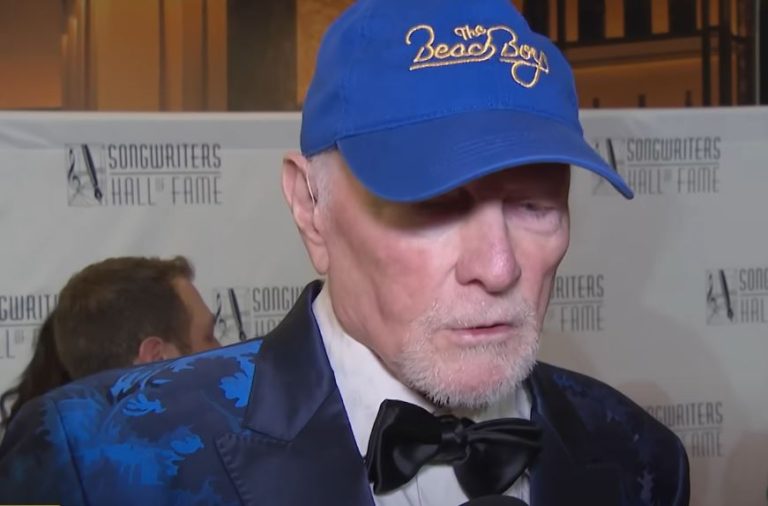Mike Love has painstakingly built a career over the last 60 years that combines legal strategy, musical legacy, and nostalgia into an unexpectedly strong financial portfolio. He led a cultural movement as a co-founder of the Beach Boys, creating sun-soaked songs that continue to be played for generations to come. Love’s business sense and incredible perseverance have contributed to his $80 million net worth, even though his cousin Brian Wilson is more widely admired for his inventiveness.
Mike Love successfully made money off of a brand that was based on the surf, sun, and optimism of California through shrewd legal disputes and unrelenting touring. He obtained co-authorship for over 30 songs in 1992 after defeating Brian Wilson in a lawsuit alleging that Wilson had been wrongfully denied songwriting credit. In addition to being financially significant, that court victory was also a historical correction. Love changed the royalty landscape for his family by recovering what was rightfully theirs, guaranteeing that the Beach Boys’ timeless catalog would continue to benefit future generations.
Mike Love Net Worth: The Summer That Pays Forever
| Attribute | Details |
|---|---|
| Full Name | Michael Edward Love |
| Date of Birth | March 15, 1941 |
| Age (2025) | 84 years old |
| Place of Birth | Los Angeles, California, USA |
| Net Worth | $80 Million |
| Primary Role | Vocalist, Lyricist, Performer |
| Band Affiliation | Co-founder of The Beach Boys |
| Iconic Songs | “Kokomo”, “Good Vibrations”, “California Girls”, “I Get Around” |
| Lawsuit Payout | $13 Million for songwriting credits (1992) |
| Touring Rights | Owns exclusive rights to perform under “The Beach Boys” name |
| Family Links | Cousin of Brian Wilson, uncle to NBA star Kevin Love |
| Current Spouse | Jacqueline Piesen (married since 1994) |
His financial situation has significantly improved since the 1990s. Royalties from streaming increased after those credits were restored. Each performance and license added up subtly but steadily, making songs like “California Girls” and “Wouldn’t It Be Nice” mainstays of ads, movies, and even political rallies. He became the face of the Beach Boys’ contemporary incarnation by using his ownership of the touring name, which was granted after years of internal strife. The Beach Boys’ touring act is still a lucrative venture today, especially appealing to international nostalgia markets, state fairs, and music festivals.
Mike Love never left the stage, in contrast to many of his peers. He persisted in touring relentlessly through strategic alliances, frequently bringing in John Stamos and other performers with family ties as special guests. Despite being less theatrical than their origins in the 1960s, these performances continue to appeal to a wide range of audiences and are both emotionally and commercially compelling. Fans see it as a comeback. It’s a steady source of income for Love.
Love’s flexibility has been especially creative. He leaned forward while other rock icons leaned into retirement. He published solo albums, co-authored books, and practiced transcendental meditation. His dedication to maintaining and changing the band’s culture was further cemented by his 2017 album “Unleash the Love,” which featured a mix of spiritual ballads and remakes. By fusing nostalgia and wellness, he drew followers who were looking for meaning rather than just memories.
His brand was repositioned with remarkable success thanks to that change. Love was viewed as a philosophical symbol of coastal optimism rather than just the lead singer of a bygone era. He led Club Kokomo Spirits, a beach-themed rum company that complements his musical persona, and he kept partnering with family-friendly companies. This diversification enhances his entire portfolio and is more than just a branding exercise. It’s a subtly astute business move.
Admittedly, his image has caused division. While some fans condemn his treatment of Wilson and his bandmates, others see him as an essential defender of the Beach Boys’ reputation. Nevertheless, his strategy has proven to be very effective in terms of finances and operations. Love offered consistency as opposed to Brian Wilson’s intermittent tours and emotional withdrawal. He transformed the band into a viable business, with dozens of employees and a yearly fan base in almost every state and nation.
Love made sure he would last in a tumultuous field by establishing himself as the keeper of summer. Love avoided the danger of losing their appeal by crafting an experience that feels both timeless and vintage, unlike many other music icons. The Beach Boys’ touring act recovered quickly in the 2020s despite economic uncertainty and a pandemic, highlighting the especially positive effects of musical familiarity during social stress.
Although his contribution to the band was structurally essential, it was frequently overlooked. He wrote lyrics that immediately struck a chord with listeners, turning Wilson’s intricate music into hits that could be played on the radio. Even though interpersonal conflict occasionally clouded it, the group’s early success made this collaborative clarity very evident. And rather than retreating when that creative collaboration broke down, Love used his annoyance to reclaim his rights.
From the perspective of modern entertainment finance, Love’s approach is instructive. He made the most of his current assets rather than placing bets on fresh hits. He prioritized performance revenue and brand preservation over pursuing critical acclaim. He protected profits over several turbulent decades by implementing this strategy early. Although his financial trajectory did not reflect innovation, it did reflect strategic endurance, which is a highly effective quality in any field.
Mike Love’s significance as a key player in the Beach Boys story will only grow in the upcoming years as music documentaries gain popularity and legacy catalogs fuel streaming revenue. His tale, though contentious and well-planned, provides a different path to stardom. One based on clarity rather than chaos. On expansion rather than explosion. Dependable performance, not reinvention.


